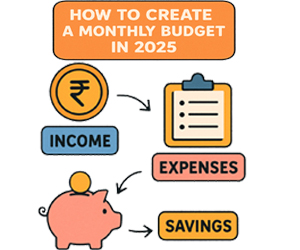Managing money in 2025 is not just about tracking expenses—it’s about building financial stability in a fast-changing world of digital payments, rising living costs, and new investment options. A monthly budget is your roadmap to saving smarter, reducing debt, and reaching financial goals.
In this guide, you’ll learn how to create a monthly budget in 2025, step by step, with the latest strategies and tools.
🔑 Why You Need a Budget in 2025
- Inflation & Rising Costs – Groceries, rent, and fuel are more expensive compared to previous years.
- Digital Spending Habits – Online shopping, UPI payments, and subscriptions make it easy to overspend.
- Financial Goals – Whether saving for a house, emergency fund, or crypto investments, budgeting helps track progress.
- Debt Control – A budget keeps credit card bills and EMIs under control.
👉 In 2025, budgeting is not optional—it’s essential for financial freedom.
📝 Step 1: Calculate Your Total Income
Start by listing all income sources:
- Salary (after tax)
- Freelance work or side hustles
- Passive income (rent, dividends, investments)
- Government benefits (if applicable)
💡 Tip: Use a budgeting app like YNAB, Mint, or Goodbudget, which now support digital wallets and UPI in 2025.
💳 Step 2: Track and Categorize Your Expenses
Divide your expenses into fixed and variable:
- Fixed expenses: Rent, EMI, internet, insurance.
- Variable expenses: Groceries, transport, eating out, online shopping.
- Future savings: Retirement, emergency fund, investments.
📊 Use digital tools that auto-track your spending from bank/UPI transactions.
📌 Step 3: Apply a Budgeting Method
Here are three powerful budgeting strategies for 2025:
1. 50/30/20 Rule
- 50% Needs (housing, food, bills)
- 30% Wants (entertainment, travel)
- 20% Savings & Investments
2. Zero-Based Budgeting
Every rupee is assigned a purpose. Income – Expenses = 0.
3. AI-Smart Budgeting
Many apps now use AI to predict overspending and suggest savings in real time.
💡 Step 4: Set Realistic Financial Goals
In 2025, goals are more diverse than before:
- Build a 6-month emergency fund
- Save for education or property
- Invest in stocks, ETFs, or crypto
- Plan for retirement security
🎯 Break them into short-term (3–6 months) and long-term (1–5 years).
📱 Step 5: Use Technology to Automate Budgeting
Automation saves time and removes human error. In 2025, you can:
- Set auto-savings rules (rounding up transactions, auto-deposits).
- Use AI finance assistants for real-time insights.
- Track crypto & stock investments in budgeting dashboards.
🚀 Step 6: Review & Adjust Monthly
Your budget should adapt to lifestyle changes:
- Unexpected expenses (medical, travel)
- Salary increments or side income
- Changes in financial goals
✅ End each month by reviewing what worked and what didn’t.
🌟 Pro Tips for Budgeting Success in 2025
- Avoid buy now, pay later (BNPL) traps.
- Use cash-stuffing envelopes for categories prone to overspending.
- Keep a “fun fund” so you don’t feel restricted.
- Track subscription services (Netflix, Spotify, cloud storage)—cancel unused ones.
📊 Example of a 2025 Monthly Budget (₹50,000 Income)
| Category | Amount (₹) | % Allocation |
|---|---|---|
| Rent & Utilities | 15,000 | 30% |
| Groceries & Food | 10,000 | 20% |
| Transport | 5,000 | 10% |
| Entertainment | 5,000 | 10% |
| Savings & Investments | 10,000 | 20% |
| Emergency Fund | 5,000 | 10% |
✅ Final Thoughts
Creating a monthly budget in 2025 isn’t about restricting yourself—it’s about giving every rupee a purpose. With AI tools, automated savings, and smart financial strategies, you can achieve financial stability, pay off debts faster, and grow wealth for the future.
👉 Start today with one step: Track your spending this month. Once you see where your money goes, you’ll gain control over your financial journey.

